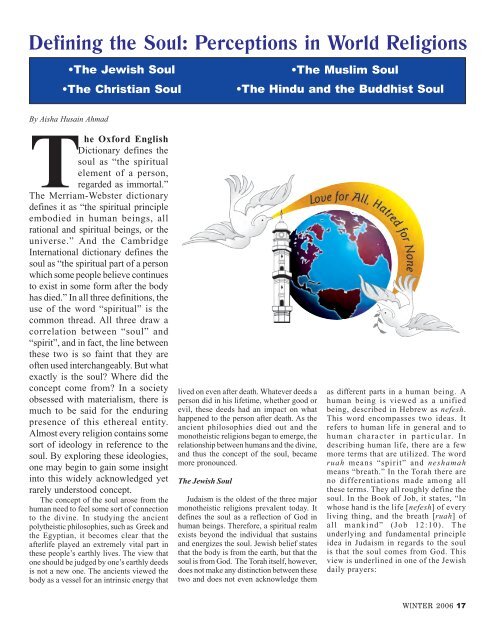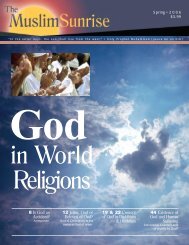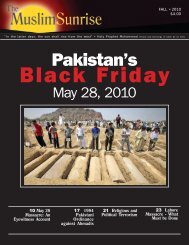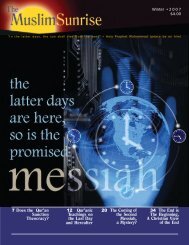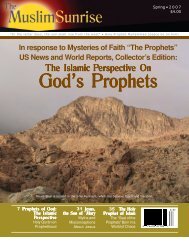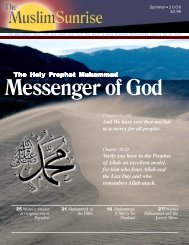Create successful ePaper yourself
Turn your PDF publications into a flip-book with our unique Google optimized e-Paper software.
Defining the Soul: Perceptions in World Religions•<strong>The</strong> Jewish Soul•<strong>The</strong> Christian Soul•<strong>The</strong> <strong>Muslim</strong> Soul•<strong>The</strong> Hindu and the Buddhist SoulBy Aisha Husain Ahmad<strong>The</strong> Oxford EnglishDictionary defines thesoul as “the spiritualelement of a person,regarded as immortal.”<strong>The</strong> Merriam-Webster dictionarydefines it as “the spiritual principleembodied in human beings, allrational and spiritual beings, or theuniverse.” And the CambridgeInternational dictionary defines thesoul as “the spiritual part of a personwhich some people believe continuesto exist in some form after the bodyhas died.” In all three definitions, theuse of the word “spiritual” is thecommon thread. All three draw acorrelation between “soul” and“spirit”, and in fact, the line betweenthese two is so faint that they areoften used interchangeably. But whatexactly is the soul? Where did theconcept come from? In a societyobsessed with materialism, there ismuch to be said for the enduringpresence of this ethereal entity.Almost every religion contains somesort of ideology in reference to thesoul. By exploring these ideologies,one may begin to gain some insightinto this widely acknowledged yetrarely understood concept.<strong>The</strong> concept of the soul arose from thehuman need to feel some sort of connectionto the divine. In studying the ancientpolytheistic philosophies, such as Greek andthe Egyptian, it becomes clear that theafterlife played an extremely vital part inthese people’s earthly lives. <strong>The</strong> view thatone should be judged by one’s earthly deedsis not a new one. <strong>The</strong> ancients viewed thebody as a vessel for an intrinsic energy thatlived on even after death. Whatever deeds aperson did in his lifetime, whether good orevil, these deeds had an impact on whathappened to the person after death. As theancient philosophies died out and themonotheistic religions began to emerge, therelationship between humans and the divine,and thus the concept of the soul, becamemore pronounced.<strong>The</strong> Jewish SoulJudaism is the oldest of the three majormonotheistic religions prevalent today. Itdefines the soul as a reflection of God inhuman beings. <strong>The</strong>refore, a spiritual realmexists beyond the individual that sustainsand energizes the soul. Jewish belief statesthat the body is from the earth, but that thesoul is from God. <strong>The</strong> Torah itself, however,does not make any distinction between thesetwo and does not even acknowledge themas different parts in a human being. Ahuman being is viewed as a unifiedbeing, described in Hebrew as nefesh.This word encompasses two ideas. Itrefers to human life in general and tohuman character in particular. Indescribing human life, there are a fewmore terms that are utilized. <strong>The</strong> wordruah means “spirit” and neshamahmeans “breath.” In the Torah there areno differentiations made among allthese terms. <strong>The</strong>y all roughly define thesoul. In the Book of Job, it states, “Inwhose hand is the life [nefesh] of everyliving thing, and the breath [ruah] ofall mankind” (Job 12:10). <strong>The</strong>underlying and fundamental principleidea in Judaism in regards to the soulis that the soul comes from God. Thisview is underlined in one of the Jewishdaily prayers:WINTER <strong>2006</strong> 17


